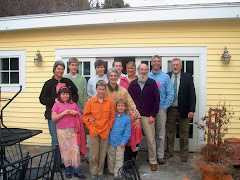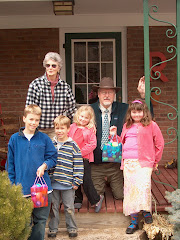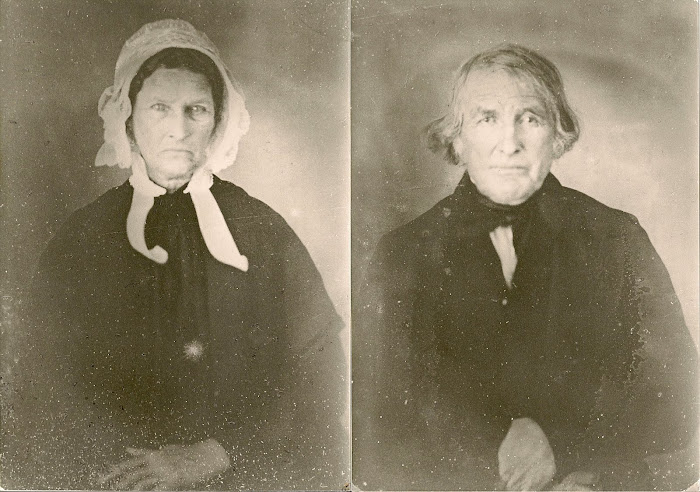Happy Halloween! Today we thought we'd share with you the story of our ancestor, George Jacobs Sr., who was hung at Gallows Hill in Salem on August 19, 1692, after stubbornly refusing to admit any wrongdoing throughout several examinations during the Salem Witchcraft Trials. T.H. Matteson captured his trial in a famous painting, "The Trial of George Jacobs" that now hangs in the Peabody Essex Museum. In it, we see a white haired, red-caped, bearded George Jacobs kneeling, pleading, perhaps, in front of the judge while all around them chaos rules: screaming and fainting young women, shouting townspeople, and wild gestures of accusation and confusion. His own granddaughter, Margaret, who had been forced to accuse her own grandfather, among others, of witchcraft in order to save her own life, shimmers in black and white at the center, her left finger pointed at George while her right hand covers her chest. Her mother, Rebecca Jacobs, who was reputed to be mentally deranged at the time (and Margaret hints at it in her letters), looms over her, arms outstretched, as if she means to swallow up her daughter. She is being restrained, as is her husband, George Jacobs Jr., who stands next to his father, watching in what must have been horror as his own daughter condemned his father. What must this have been like for "Old George Jacobs"? We can only imagine...
What do we know about George Jacobs? He was born in England around 1617, was farming in Salem by the 1640's, settling in that portion of the town which is now Danvers, northwesterly of Great Cove. He married a woman named Mary, and their son George Jacobs Jr. built, in 1677, the ancient Jacobs house, which is still standing (1924), and which has been in the family ever since. In 1718, a section of the house was called "the gun room". By many accounts, Jacobs, despite Matteson's generous treatment (rich red cape, regal features and posture, handsome face--though of course he must have been handsome!) was a 72-year old illiterate farmer and land-owner when he was executed. 72! Jacobs was nearly as old as octogenarian Giles Corey, who was pressed to death for speaking out against the accusers and casting doubt onto these young women. What a horrible thing to have to go through at that age--at any age--but especially when you should be able to enjoy the endless meadows and sunshine of the golden years. Instead, imagine trying to navigate the Puritan landscape of witch hunts and Salem village girls gone wild--it must have been an absolute raging nightmare for them all.
George Jacobs, Sr., along with his son George Jacobs, Jr., his son's wife Rebecca (Andrews) Frost Jacobs, granddaughter Margaret (daughter of George Jr. and Rebecca), and George Jr.'s brother-in-law Daniel Andrews, were all accused of witchcraft, and the grandfather "Old George Jacobs," was examined several times, tried in court, and sentenced to hang. Along with his granddaughter Margaret, he was examined May l0th, 1692 by Corwin and Hathorne, and the accusing girls--including afflicted 20-year old Sarah Churchill, who speaks below, and who served as a servant in George Jacobs Jr.'s home, Mary Warren, Mary Walcott, Elizabeth Hubbard, and Sarah Bibber (Vibber) were present in full force. Another accuser, the infamous Abigail Williams, claimed that she had been "afflicted by his apparition." And while Sarah Churchill presented her "evidence" in the Court, Jacobs was brave--though some would say foolish--in his doggedness to stand up for and cling to his innocence, despite what he must have known would be the consequences:
Jacobs: I am as innocent as the child born tonight. I have lived thirty-three years here in Salem.
Court: What then?
Jacobs: If you can prove that I am guilty I will lie under it.
Sarah: Last night I was afflicted at Deacon Ingersoll's, and Mary Walcott said it was a man with two staves.It was my master . . .
Jacobs: Pray do not accuse me. I am as clear as your worships. You must do right. judgments."
The only chance he had to save his life was to admit to the accusations--that he on several occasions appeared as a specter, hurt the girls, and lived a "wicked life."
Court: Did he not appear on the other side of the river and hurt you? Did not you see him?
Sarah:Yes, he did.
Court: Look there, she accuseth you to your face, she chargeth you that you hurt her twice. Is it not true?
Jacobs: What would you have me say? I never wronged no man in word or deed.
Court: Here are three evidences.
Jacobs: You tax me for a wizard. You may as well tax me for a buzzard. I have done no harm.
The Court reveals that Jacobs cannot read:
Court: Doth he ever pray in his family?
Jacobs: Not unless by himself.
Court: Why do you not pray in your family?
Jacobs: I cannot read.
Court: Well you may pray for all that. Can you say the Lord's prayer? Let us hear you.
Record: (He might [missed] in several parts of it and could not repeat it right after many trials.
Ay, like me, poor George could not quite recite the whole of the Lord's prayer! Must run in the family...
At the end of his first examination, he steadfastly rejects any false admission, and bravely accepts his plight:
Jacobs: Well, burn me or hang me I will stand in the truth of Christ. I know nothing of it.
Sadly, there is much evidence, as outlined in The History of Salem, Massachusetts Vol. III (Perley), that Sarah Churchill's dishonesty in accusing Jacobs had actually been revealed but rebuffed. Here is an account: "Sarah Churchill gave positive evidence against Mr. Jacobs, and subsequently Sarah Ingersoll deposed that Sarah Churchill came to her, crying and wringing her hands, seemingly much troubled in spirit. She asked her what the matter was. She answered that she had undone herself. Miss Ingersoll asked what was it about, and she answered, that it was in belying herself and others in saying that she believed that she had set her hand to the book. She answered, and said, "No, no, no; I never did." She was asked then what made her say she did. She answered that it was because they threatened her, and told her they would put her into the dungeon along ,with Mr. Burroughs, and thus at several times she followed Miss Ingersoll, telling her that she had undone herself. Miss Ingersoll asked her why she did not deny she wrote it, and she said it was because she had stood so long in it that now she did not dare to. She said, also, that if she told Mr. Noyes but once she had set her hand to the book, he would believe her, but if she told the truth and said she had not set her hand to the book a hundred times he would not believe her."
On May 11th, George was examined for a second time, with various accusers at the ready to fall into fits at the mere mention of his name. Abigail Williams is described in the court proceedings as "the bewitched (who) fell into most grevious fits and screechings when he came in," and Mercy Lewis proclaimed "this is the man (after much interruptions of fits) he almost kills me." Ann Putman and Abigail Williams "had each of them a pin stuck in their hands, and they said it was this old Jacobs." When asked if he is "not the man that made disturbance at a Lecture in Salem," George replied "No great disturbance. Do you think I use witchcraft?"
"Yes indeed"
Poor George can only say, "No I use none of them."
And what to make of this? A physical examination of Jacobs while he awaited his fate in prison netted this discovery by George Herrick: "...his Right Sholder wee found A tett aboute A quarter of an Inch longue or better with A Sharpe point Drupeing downwards so that I tooke A pinn from s'd Dounton and Run it through the s'd tett but their was nither watter blood nor curruption nor any other matter and so wee make Returne." A "tett?" Just what is Herrick referring to?! Something about a 1/4" long with a sharp point, dropping downwards, on his right shoulder...what would that be? So they took a pin--no doubt recently sterilized--and tried to pop it? And neither water, blood, corruption, nor any other matter came out? Ah, Jay-sus.
Other accusations--and the accusers were many--included choking, torturing, biting, scratching, pinching and beating them with his "staffe," being in cohorts with a "black man" (horrors), having two wives, and of course, asking them over and over again to put their mark and write in his book, presumably, the "Devil's Book." (ah, the irony in that!) Someone should have kicked the stuffing out of the accusers' heads, and knocked some sense back into them. There's also mention of strange happenings, apparitions, disturbances, and relations with strange oddities: "Likewise a woman appeares to this Deponent who lives at Boston at the Uper end of the Towne whose name is Mary: she goes in black clothes hath: but one Eye: with a Crooked Neck and she saith there is none in Boston." Sounds Goth to me.
On May 14th, less than a week after Old George's examination in Court, warrants were issued for the arrest of his son, George Jacobs, Jr., and his daughter-in-law, George Jr.'s wife Rebecca. Mr. Jacobs managed to escape, but his wife was arrested, and "as she was taken away by the officers, her four little children followed her, but they could not go far, as the youngest was but two years old." Neighbors cared for the Jacobs children while their mother was kept in irons for eight months, before being indicted and sent to trial on January 3, 1692/93, during which she was promptly acquitted, and one hopes, reunited with her children. We couldn't find any account as to what happened to her husband, George Jacobs Jr., who fled and left her (and the children) to fend for herself in jail.
In the meantime, the horrors continued. With accusations flying and cases mounting, a special court, comprised of seven judges, was set up to oversee the trials on May 27. "These magistrates based their judgments and evaluations on various kinds of intangible evidence, including direct confessions, supernatural attributes (such as "witchmarks"), and reactions of the afflicted girls. Spectral evidence, based on the assumption that the Devil could assume the "specter" of an innocent person, was relied upon despite its controversial nature." They didn't waste much time: Bridget Bishop was the first witch to be officially executed on June 10, 1692. Many more followed. By the end, 19 men and women would be executed altogether.
On August 5, 1692, George Jacobs Sr. was found guilty and was sentenced to hang. On August 19, he was hung on Gallows (also known as Witches) Hill, along with George Burroughs, Martha Carrier, John Willard, and John Proctor. Herewith the mood that day, a Friday, as recounted in A History of Salem, Massachusetts: "A procession formed at the jail on St. Peter's Street on that day, and with the victims in a cart, proceeded to the place of the former hangings. All of them protested their innocence; but Cotton Mather, who was there told them that they all died by a righteous sentence. When Mr. Burroughs was upon the ladder, he made a statement of his innocence so solemnly and seriously that the people, who were present in large numbers, admired him for it; and it seemed to some that the spectators would hinder the execution. He closed his prayer by repeating the Lord's prayer so composedly and fervently that it was very affecting and drew tears from many. The accusers, who were there to see the culmination of their work, said .that the "black man" stood and dictated to him. It seemed to make no difference whether the accused could repeat the Lord's prayer or not, to them it was evidence of guilt of witchcraft either way, as they pleased. As soon as the hangings ceased, Cotton Mather, who was on horseback, spoke to the people, and declared that Mr. Burroughs was not an ordained minister and that Devil was often transformed into an angel of light. This somewhat appeased the people. When Mr. Burroughs was cut down, he was dragged by the halter to a hole or grave between the rocks, about two feet deep, his shirt and breeches being pulled off, and an old pair of trousers of one of the other men who was executed, put on. He was put into the hole with the bodies of Willard and Mrs. Carrier. One of his hands and his chin and a foot of one of the others were left uncovered. After dark, Mr. Buffum went to the crevice and covered the exposed parts of their bodies."
Where did the bodies go after they were stuffed into the crevice? Some fell into the river, and were carried away, and in fact, "under the ridge where the execution occurred was the North River, between which and the ridge was the ancient highway. It was easy to pass the bodies to a boat in the stream, and from 'thence up North and Danvers rivers to the Great Cove, near George Jacob's home..." Those that were not carried away were buried near the line of the fence, northwest of the crevice. Old George's body was perhaps snatched by his family and buried on his property, where he lay unsettled for hundreds of years. He is now buried at the Nurse Homestead in Danvers, Mass., formerly Salem Village. From the Nurse Homestead site: "In August 1992, the remains of another of the 1692 Witchcraft victims, George Jacobs, Sr., were also laid to rest here following a dignified ceremony in the reproduction Salem Village Meetinghouse. The remains had been unearthed in the 1950's at the former Jacobs property. Resting in quiet storage for many years, they were buried by the Danvers Alarm List Company and Salem Village Witchcraft Tercentennial Committee of Danvers, as one of several projects undertaken during the 300th anniversary observation of the witchcraft period. In May 1993, a stylized facsimile of a slate gravestone was dedicated over the remains, costs having been raised by the Danvers Alarm List Company, Jacobs and other witchcraft descendants, and interested public. The gravestone includes as an epitaph the brave words uttered by Jacobs at his examination. "Well! Burn me or hang me but I'll stand in the truth of Christ." The skull on the stone represents death, while on either side, the carved wings represent the belief that the soul would wing its way to heaven. Jacobs and Nurse stood ready with their lives not to confess to something they did not do, but to speak the truth no matter the consequences."
The day following her grandfather's execution, Margaret Jacobs, daughter of George Jr., and Rebecca Jacobs, wrote from Salem jail a letter to her father. In order to save herself after being accused, she had also testified against her grandfather, and one can only imagine the horrors of what this young girl of sixteen went through, and had to live with as recompsense. Her letter:
Honored father--After my humble duty remembered to you, hoping in the Lord of your good health, as blessed be God I enjoy, though in abundance of affliction being close confined here in a loathsome dungeon, the Lord look down in mercy upon me, not knowing how soon I shall be put to death, by means of the afflicted persons. My grandfather having suffered already and all his estate seized for the king. The reason of my confinement is this, I having, through the magistrates threatenings, and my own vile and wretched heart, confessed several things contrary to my own conscience and knowledge, though to the wounding of my own soul, the Lord pardon me for it. But O, the terrors of a wounded conscience, who can bear ? But blessed be the Lord, he would not let me go on in my sins, but in mercy, I hope, to my soul, would not suffer me to keep it in any longer, but t was forced to confess the truth of all before the magistrates who would not believe me, but 'tis their pleasure to put me here, and God knows how soon I shall be put to death. Dear father, let me beg your prayers to the Lord on my behalf, and send me a joyful and happy meeting in Heaven. My mother, poor woman, is very crazy, and remembers her kind love to you and to uncle, viz. d--A--, so leaving you to the protection of the Lord, I rest your dutiful daughter.
MARGARET JACOBS From the dungeon in Salem prison, Aug. 20, 1692
At the next session of the court, she confessed that she had done wrong: "... They told me if I would not confess I should be put down into the dungeon and would be hanged, but if I would confess I should save my life." The whole of her recant spills forth: "The Lord above knows I know nothing in the least measure, how or who afflicted them, they told me without doubt I did, or else they would not fall down at me, they told me if I would not confess I should be put down into the dungeon and would be hanged, but if I would confess I should have my life. The which did so affright me with my own vile heart, to save my life made me make the like confession I did, which confession, may it please the honored court is altogether false and untrue . . . Whatever I said was altogether false against my grandfather and Mr. Burroughs, which I did to save my life and to have my liberty, but the Lord, charging it to my conscience, made me in so much horror that I could not contain myself before I had denied the confession; which I did, though I saw nothing but death before me, choosing rather death with a quiet conscience than to live in such horror, which I could not suffer. Whereupon my denying my confession I was committed to close prison."
Poor Margaret, with her "disorder in her head," was forced to remain in prison while her case was continued, as she could not pay the fees and charges of the jailer. Alas.
The heirs of Old George Jacobs received seventy-nine pounds in recompense for the horrors of the Salem Witchcraft Trials. Over 125 people had been accused; ...had been executed. For those who had been members of the church, and were thus excommunicated at the height of their suffering, their executions were especially torturous, for without church membership, how would they ever get to Heaven?
Just why were the Jacobs targets of these accusers? Was it a random choice for these drama queens to accuse this family? Or was there something behind it? In many ways the witchcraft trials resemble the cruelty and spirit of persecution shown to the Quakers. It seemed an unfortunate combination of circumstances that led to the hysteria: "...only an ongoing frontier war, economic conditions, congregational strife, teenage boredom, and personal jealousies can account for the spiraling accusations, trials, and executions that occurred in the spring and summer of 1692." The ensuing torturous persecution, suffering, exectutions, and madness is the stuff of fictionalized plays, like Arthur Miller's The Crucible, and, quite simply, bad dreams. Theories abound as to what set the girls off in the first place: some strange illness, a really bad hair day, hormones gone bad, or, a more recent theory, "convulsive ergotism" brought on by eating grain infested with the fungus-produced ergot. Questions remain, as does our culture's merciliess insistence on flushing out and punishing oddballs and misfits, whistle blowers and truth tellers. And we'll never really know who Old George Jacobs was. --ESG, with help from researchers DRP and LGP
A GENEALOGY OF SORTS, with a few missing links
George Jacobs Sr.
b. 1612, England
arrived Salem sometime before 1674
m. Mary (who later married a man who had also been widowed by the Trials in 1693)
d. August 19, 1692, Gallows Hill, Salem
Son George Jacobs Jr.
b. Salem
m. Rebecca (Andrews) Frost, baptised April 18, 1646, married John Frost, June 1666. Frost died 1672
4+ children, including
Son George Jacobs III
b. Sept. 29, 1677, Salem
m. Hannah Cousins Dec., 1701, 9 children; m. Elizabeth Donnell, no children
At some point, George III must have decided to escape Salem and what must have been difficult, daily reminders of his family's persecution and demise, for Maine, where his son George was born.
Son George Jacobs IV
b. Nov. 9, 1718, Wells, Maine
m. Mary Woodman
Son Elias Jacobs
b. Jan. 26, 1745, Wells, York, Maine
m. Mary Dorman, Oct. 6, 1768; Mary b. 1743 in Wells
d.
Son Elias Jacobs Jr.
b. 1779, Scituate, MA
m. Abigail Elizabeth Parker, b. April 22, 1784, d. 1853
d. 1825, Portland, Maine
Daughter Elizabeth Barstow Jacobs
b. Oct. ?/Nov. 26, 1806, Portland, Cumberland, Maine
m. Arthur Reed, Sept. 17, 1833, Orr's Island, Maine
d. March 25, 1899, Bowdoinham, Maine
Son Elias Reed
b. June 11, 1843, Orrs Island, Maine
m. Mary Merrill Purinton (b. Aug. 30, 1843, E. Harpswell, ME; d. Aug. 7, 1882, Bowdoinham) on May 22, 1867
m. Jane Barker, 1894
d. May 24, 1922, Brunswick, ME
Son Frank Purinton Reed
b. Jan. 5, 1869, Orrs Island, Harpswell
m. Bertha Lucetta Fay (b. May 20, 1871, Chester, MA; d. March 26, 1938, W. Roxbury, MA) on May 8, 1895
d. Nov. 15, 1959, N. Conway, NH
Son Carroll Purinton Reed
b. Oct. 9, 1905, W. Roxbury, MA
m. Katharine Damon (b. July 30, 1916, Malden, MA; d. June 20, 1999, N. Conway, NH)
on Dec. 18, 1937
d. Jan. 29, 1995, N. Conway, NH
Daughter Damon Reed
b. March 25, 1940, Boston, MA
m. Donald Gardner Jr. (b. June 25, 1935, Winchester, MA) June 17, 1961, N. Conway, NH
Daughter Elizabeth Seward Gardner
b. Oct. 14, 1965, N. Adams, MA
m. James Samuel Poulsen (b. July 14, 1965, New London, CT) July 21, 1990, N. Conway, NH
Son Luke Gardner Poulsen
b. Sept. 17, 1994, Concord, MA
Son Dominick Reed Poulsen
b. Feb. 28, 1999, Greenfield, MA
Subscribe to:
Post Comments (Atom)





No comments:
Post a Comment